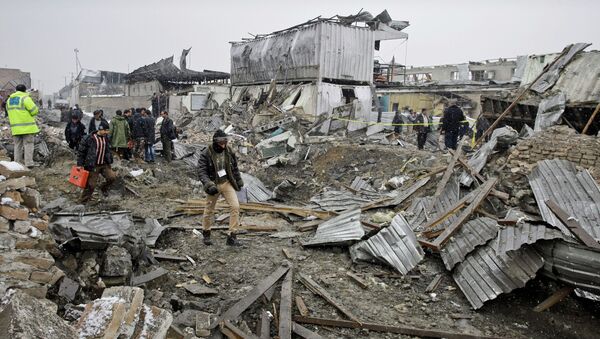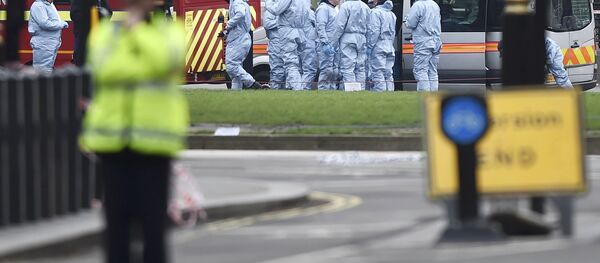Dundee-born McLintock, a 53-year-old resident of Arbroath, is known to Muslims as Yaqoob Mansoor Al-Rashidi, and serves as President of the Al Rahmah Welfare Organization. While raised a Catholic, he converted to Islam at Edinburgh University in the early 1980s and may have fought against the Red Army in Afghanistan.
The charity claims to help orphans and widows in Afghanistan, Pakistan and Syria — but the US Treasury has alleged the group in fact provides money for extremist activities, and in 2016 placed him on a "specially designated global terrorist" list, which froze any property he had within US jurisdiction and banned US citizens from doing business with him.
WikiLeaks documents released in 2014 show US officials believe McLintock was close to Afghan terror training camp leader Ali Muhammad Abdul Aziz al-Fakhri.
A May report issued by London-based charity Action on Armed Violence supported the Treasury's declaration, stating McLintock hired fighters to obtain photos and personal details of children in order to create falsified dossiers and attract funding for the Taliban under the guise of supporting orphans.
New AOAV report: "Understanding the regional and transnational networks that facilitate IED use" https://t.co/VqTrZquoF7 #IED pic.twitter.com/TXcmpfFk5D
— AOAV (@AOAV) May 31, 2017
The Al Rahmam Welfare Organization was also used as a front to fund militant activities in Kunar Province, and McLintock reportedly provided funds to Shaykh Aminullah, who runs the designated Ganj Madrasa which provides funds to the Taliban.
"In 2013, McLintock met with several Taliban commanders and was actively involved in preparing madrasa students to travel and fight in Afghanistan, as well as teaching insurgents how to use IEDs. According to the Treasury, RWO was used as a front to collect more than US$180,000 from unknowing UK donors that went directly into Taliban hands," the report said.
RWO also has several cooperative efforts together with organizations around the world, including Masjid al-Tahwid in London, Qatar Charity, the Kuwait-based International Islamic Charity Organisation; the Abu Dhabi-based Khalifa bin Zayed al-Nahyan Foundation; the Saudi-based King Abdullah's Relief Campaign for Pakistani People; the Pakistan-based Welfare and Development Org; and the Saudi-based World Assembly for Muslim Youth.
McLintock — who in 2001 was arrested on Christmas Eve at a checkpoint near Afghanistan's border and held until he had been interrogated by intelligence services — and RWO have categorically denied all accusations of terrorist involvement.
McLintock's apparently fundamentalist conversion to Islam may surprise, but a January UK Center for Research and Evidence on Security Threats report on Islamic conversion notes within Islamist extremist and terrorist circles, converts are over-represented.
NEW CREST GUIDE Islam: Conversion by @Kim_Knott on why some people choose to convert, what they experience and more. https://t.co/moXyzk6hiX pic.twitter.com/SVlUH5PBRV
— CREST (@crest_research) January 23, 2017
In those countries for which data is available, converts represent a higher percentage among Muslims involved in Islamist violence and fighting abroad than among the general Muslim population.
In the US, since 9/11 for example, converts were found to constitute a "jihadi underclass" — less well educated than born-Muslims, and more likely to be unemployed, have a criminal record and a history of mental health problems. These factors were less pronounced in the UK sample.
The report stated social isolation may be a factor in converts' attraction to extremist movements — they often face misunderstanding and from friends and relatives as well as from the media and a wider public.
Moreover, despite their expectations, they are not always welcomed by Muslim communities, and often remain outsiders. For some, loneliness and lack of support can leave them vulnerable to extremist groups eager to recruit new members. Despite these factors however, the majority of converts to Islam are not drawn into Islamist extremism.
If the allegations against McLintock are true, he may well have played a role in the surge of improvised explosive devices in Afghanistan — Action on Armed Violence's report concluded IEDs have rapidly overtaken landmines as the dominant threat to civilians in conflict zones.
IEDs were said to "consistently cause" the most civilian harm of any weapon category, and between 2011 and 2015 were responsible for a total of 105,071 civilian casualties — 59 percent of all casualties from explosive violence worldwide.





